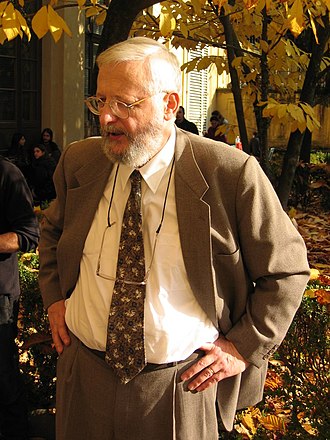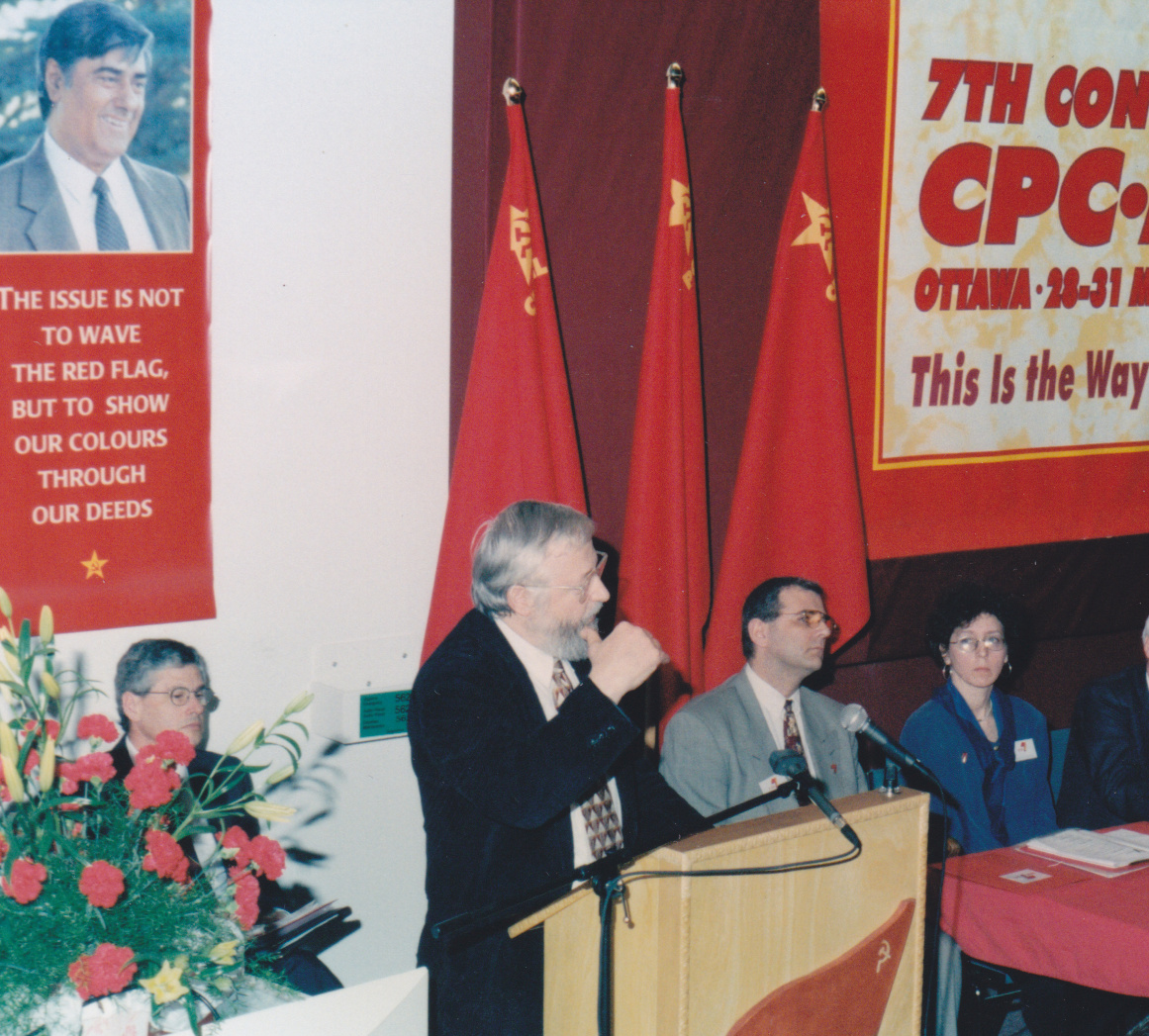|
In Memoriam
F. William Lawvere

February
9, 1937 – January 23, 2023
With profound sorrow we inform you of the death of the renowned
mathematician Dr. William Lawvere on January 23, 2023. Professor Lawvere
was a good friend of the Communist Party of Canada (Marxist-Leninist), a
fellow traveller who always took the high road of civilization, engaged
in settling
scores with the old conscience of society and removing the blocks in the
way of progress and enlightenment.
Beginning in the early 1970s, he worked on several philosophical and other projects related to the Necessity for Change
and dialectics with CPC(M-L)'s founder and leader Hardial Bains, a
scientist and philosopher in his own right. From 1969 to 1971, he was a
Killam Scholar at Dalhousie
University, in Halifax, head of a prestigious international team of
mathematicians who came there to study with him. But in 1971, when
Professor Lawvere protested the War Measures Act and crimes
committed with the suspension of civil liberties by the government of
Pierre Trudeau, Dalhousie
refused to renew his contract, despite the protestations of his own team
of mathematicians. More than 1,000 students rallied in the lobby of the
Dal Student Union Building to oppose the arbitrary dismissal of
Professor Lawvere.
On many occasions, Professor Lawvere joined us in Canada to discuss
important topics and contribute his thorough and extensive knowledge on
them. In February 1996, he spoke at the Inter-Disciplinary Conference
held at the University of Windsor on the theme The Origin of Consciousness and
Social Change. Papers delivered on that occasion presented
important insights into consciousness existing independent of us, the
historiography of the Cold War, the emergence of the modern democratic
personality and the like. Professor Lawvere presented a paper titled The History and
Philosophy of Mathematic Reform which examined various aspects of a
trend in pedagogy which restricted the knowledge of mathematical
science showing, amongst other matters of concern, how this provided an
effective basis for promoting mysticism and blind acceptance of
authority.
 Professor Lawvere addresses
the Professor Lawvere addresses
the
7th Congress of CPC(M-L).
|
In 1997, he attended the funeral of Comrade Bains along with scholars
from various parts of the world. He also attended the 7th Congress of
CPC(M-L) in 1998 where he expressed his appreciation for the work of
Hardial Bains and contributed to the thesis under discussion. He
attended the Party's 35th anniversary celebration in 2005 where he again
expressed his appreciation for the work of the Party on theory and the
need for modern definitions. He later wrote that
the 35th anniversary "was a very rewarding occasion. [...] In
particular, that occasion is leading to further advances in my work,
especially the project to
appropriately commemorate the centenary of Lenin's books on philosophy
by detailing how they have been a useful guide in the study of 19th and
20th century philosophical developments, both from the point of view of
natural science as well as from the point of view of the class struggle
for
enlightenment. Since Hardial pointed out the importance of those books
35 years ago, they have been my constant companions. [...]"
Hearing about the death of Professor Lawvere, his long-time associate
Eric Hoffman had this to say in appreciation of the profound influence
that both Hardial Bains and Bill Lawvere have had on his own life and
work:
"Developing from their earliest seminal work done separately in the
1960s emerges the strongest evidence for a new and surprising
connection. This connection forms a part of and is embedded in an
ensemble of relations among humans and nature. Bill pointed out that the
objectivity of this complex
compels the relentless adherence to the needs of the study of space and
quantity.
"In one of the interviews on his blog, Bill said, 'The core of
mathematical theories is in the variation of quantity in space and in
the emergence of quality within that.' Whether considerations are
geometry, categories, logic, the transition of political forms, kinship
relations or any other,
Bill corroborated that the unity and identity of opposites, the
dialectic, lives.
"Bill's work will endure as a contribution to expanding the space of enlightenment."
In the message of condolences the First Secretary of the Central
Committee of CPC(M-L) sent to Professor Lawvere's family, she wrote:
"Bill contributed so much in his lifetime we have much to appreciate.
His enthusiasm and dedication to the discovery of new things was always
inspiring. His approach was always vigorous, dedicated, fresh in many
ways. His patience as a teacher, the intelligence and coherence of his
arguments, his
enthusiasm for the younger generation and for their edification, and his
courageous adherence to the high road of civilization were outstanding.
"Meeting with Bill was always a great pleasure. We will always
treasure his friendship, generosity of spirit and dedication to our
common cause for which he spoke out without trepidation. It showed he
was made of special stuff."
To illustrate the quality of his work as an educator in mathematics,
his straightforward approach to explaining the matter at hand and
discussing with those who showed an interest in his work, we give the
example of the answer he gave to a request to provide "a broad
justification of why category
theory may be so useful." Here is what Bill had to say:
Everyday human activities such as building a house on a hill by a
stream, laying a network of telephone conduits, navigating the solar
system, require plans that can work. Planning any such undertaking
requires the development of thinking about space. Each development
involves many steps of
thought and many related geometrical constructions on spaces. Because of
the necessary multistep nature of thinking about space, uniquely
mathematical measures must be taken to make it reliable. Only explicit
principles of thinking (logic) and explicit principles of space
(geometry) can guarantee
reliability. The great advance made by the theory invented 60 years ago
by Eilenberg and Mac Lane permitted making the principles of logic and
geometry explicit; this was accomplished by discovering the common form
of logic and geometry so that the principles of the relation between the
two are also
explicit. They solved a problem opened 2300 years earlier by Aristotle
with his initial inroads into making explicit the Categories of
Concepts. In the 21st century, their solution is applicable not only to
plane geometry and to medieval syllogisms, but also to
infinite-dimensional spaces of
transformations, to "spaces" of data, and to other conceptual tools that
are applied thousands of times a day. The form of the principles of
both logic and geometry was discovered by categorists to rest on
"naturality" of the transformations between spaces and the
transformations within.
Below we provide the obituary published on the occasion of Professor
Lawvere's death. We add a facsimile of the article from the Dalhousie Gazette
of January 22, 1971 on his dismissal from the Dalhousie University. We also provide the paper titled The History and Philosophy of
Mathematic Reform delivered by Dr. Lawvere at the Inter-Disciplinary
Conference on the Origin of Consciousness and Social Change held at the
University of Windsor, February 9-11, 1996. Finally, we provide an
interview with Dr. Lawvere where he explains his work in his own words.
We express our deepest condolences to Bill's life partner and
collaborator, his children, grandchildren, brothers and sisters and many
many friends and colleagues. May they all find solace in the memories
they created together.
Central Committee
Communist Party of Canada (Marxist-Leninist)
| 

 Professor Lawvere addresses
the
Professor Lawvere addresses
the 
